Mambu Payments
Product Updates
June 2025
Payments continue to evolve at a fast pace — from regulatory deadlines like the Instant Payments Regulation to new requirements introduced by the latest EPC SEPA rulebook updates. At Mambu Payments, our teams have been focused on delivering features and integrations that help financial institutions meet these demands with confidence.
Here’s a look at what we have shipped recently:
Expanding our bank and scheme coverage through new integrations
More financial institutions are expanding their geographic coverage and adapting to evolving scheme requirements. This calls for greater flexibility in how they access payment systems across regions — and faster onboarding when they do. That’s why we’ve focused on expanding our network of bank partners and reducing time-to-production for our joint clients.
Powering Australian payments through Citi integration
While we initially focused on European payment schemes, we are committed to supporting our customers globally. Mambu Payments now supports Australian payment schemes through our integration with Citi Australia.
Through Citi's infrastructure and global payment capabilities, Mambu Payments’ customers can now send and receive payments via Osko (instant payments), BECS (bulk direct credit transfers), and RITS (RTGS high-value transactions). This integration helps institutions operating or expanding into Australia streamline local payment flows.
Strengthening reach with Iberpay
Mambu Payments is now integrated with Iberpay, Spain’s national clearing system. Iberpay processes over 3 billion transactions annually, including 1 billion SEPA Instant transfers. Our first customer is already live, using Mambu Payments’ API-first platform to automate payments with Iberpay. This partnership helps institutions in Spain and Portugal access local clearing through a modern, resilient architecture.
Accelerating access to FPS, Bacs and CHAPS with ClearBank
Our integration with ClearBank is also live, with our first customer already processing payments. ClearBank is the UK’s first new clearing bank in over 250 years, offering API-first access to the UK’s domestic schemes: FPS, Bacs, and CHAPS. Through Mambu Payments, financial institutions can quickly connect to ClearBank, access their accounts, and process payments with reduced time to market.
Going live with multiple banks through Société Générale
Using Société Générale’s infrastructure for indirect SEPA participants, we have also taken more than three banks live on SEPA Instant Credit Transfers. The go-live was completed in under four months, aligned with the first requirements of the Instant Payments Regulation. This integration offers institutions a fast and compliant path to SEPA Instant.
Integrating with Memo Bank
Finally, we’ve also gone live with Memo Bank, enabling its clients to access account data, initiate SEPA Credit and Instant Credit Transfers, and manage SEPA Direct Debits — all through Mambu Payments’ platform. Memo Bank is the first independent French bank in over 50 years, built on a modern core that supports fast lending and business growth. This integration allows Memo Bank to deliver more efficient and automated payment operations to its corporate customers.
To see what’s live and what’s next, visit our bank coverage page.
Preparing for VOP: opening our sandbox for early testing
With the Verification of Payee (VOP) scheme going live on October 5, 2025, financial institutions must soon be able to verify a payee’s name and IBAN before sending SEPA payments.
We started the certification process for our VOP inter-PSP API with the European Payments Council’s VoP Scheme Sandbox, known as the VoP API Reference Toolkit (ART). This ensures that we’re on track to support a timely go-live for all our customers.
In addition, we decided to open our own VoP sandbox environment to all customers impacted by the regulation. This gives teams an opportunity to begin testing early, and build confidence ahead of the deadline.
With Mambu Payments’ VOP sandbox, financial institutions can:
- Send and receive simulated VOP requests via API or dashboard
- Simulate incoming VOP requests and test their matching algorithms using test or internal account data
- View audit trails and reporting for all sent and received VOP requests in the dashboard
Live VOP requests and access to the EPC’s Directory Service will be supported once EPC systems go live. Learn more about our VOP solution here:
- Numeral VOP overview
- API reference
Improving control and visibility across payment operations
Operational readiness and efficiency continue to drive priorities for payment teams in 2025. From VOP preparation to real-time visibility, our latest releases focus on automation, controls, and meeting regulatory requirements.
Flexible approval workflows for better compliance and security
Businesses often need controls to prevent fraud and human errors, especially for sensitive or high-value payments. That's why we've introduced payment approval workflows – robust, flexible, and auditable processes that adapt to your needs.
When a payment requires approval, it will enter a pending_approval status until all required approvers validate the operation. You can customise the rules and track progress from the dashboard.
Payment approval workflows are available via the dashboard and support multi-step, auditable approvals.
Seamless migration when switching to Mambu Payments
Migrating to a new system can be complicated and risky, especially when payment history and R transactions need to be preserved. Our migration process supports importing:
- Outgoing SCT, SCT Instant, SDD, and Bacs payments
- Incoming SCT, SCT Instant, SDD, and Bacs payments
- Return requests: recalls and originator requests for recalls by the originator (RFRO)
- SEPA and Bacs direct debit mandates
Since R transactions can be received up to 13 months, we ensure coverage of at least that period. Payments migration is part of the implementation process – contact our team for more information.
To get a detailed description of our migration process, read the changelog entry or follow our step-by-step migration guide.
Improving the dashboard experience for developers and ops teams
We’ve made improvements to the dashboard experience to help operations and developer teams move faster with more autonomy.
One-click payment order duplication
You can now duplicate any payment order with a single click. This helps reduce errors and speed up recurring or similar payments – from bills and salaries to manual payments between safeguarding and settlement accounts. Duplicates go through full validation, just like new orders. Head over to changelog for a detailed description.
Simpler account holder management
You can now create and manage account holders in the dashboard. These can be linked to internal or external accounts and used in payment orders. This simplifies account relationship management and gives business teams more control. Learn more in our changelog.
Easier event delivery tracking
The dashboard is also a key tool for developers to accelerate implementation and maintain integration visibility — so we’ve enhanced event delivery tracking.
Previously, it was hard to track the actual delivery status of events in the dashboard. Users had no overview of which channels received what, and no quick way to retry or debug issues.
To improve the developer experience in the dashboard, we’ve added delivery tracking to the Events view in the Developers section:
- Delivery status now shown on the events list and detailed views
- Visual indicators for successful, pending, or failed deliveries
- Dedicated tab for child events, with retry options
Check the in-depth description in our changelog.
September 2024
Our product and engineering team has been busy this summer to bring you 8 new bank integrations, new features, and multiple improvements.
Highlights include:
- New account verification capabilities for increased payment success rate and lower fraud
- Multi-currency accounts: manage all your accounts, including multi-currency accounts, from a central dashboard and API
- Many improvements to the dashboard and the Mambu Payments developer experience
- 8 new bank integrations including Citi, HSBC
Learn more about these capabilities below, and do not hesitate to contact us for more information.
An ever-expanding, pan-European bank coverage
This summer, we’ve integrated with 8 new banks: Citi, HSBC, Vitesse, Swedbank, Mano Bank, Belfius, and Arion Banki.
Citi’s integration opens endless possibilities for our current and future customers, thanks to Citi’s global footprint and extensive payment offerings. We are glad to now support a bank trusted by many of the world’s largest companies across all industries.
Combined with existing and new integrations and our support for multi-currency accounts (more below), building a cross-border payment infrastructure has never been easier with Mambu Payments.
Our integration with Vitesse enables us to better support insurance companies. From premium collections to claim funds management and delegated claims operations, insurance companies of all sizes have specific payments and accounts needs. They can now access Vitesse specialised payments and accounts services through Mambu Payments’ API and dashboard.
Easier management of multi-currency accounts
Monitoring and managing multi-currency accounts is time-consuming. With multi-currency accounts, customers can monitor and manage all their accounts, including multi-currency accounts, from a central dashboard and API.
Customers can now retrieve the balances for each supported currency of a connected account from the dashboard and the API.
Multi-currency accounts are available for free for customers who have access to Cash visibility.

Increase payment success rate and decrease fraud with new account verification capabilities
Company registration number verification
Customers can now check, for external accounts recorded in Mambu Payments that represent legal entities, the correspondence of the provided account number and company registration number.
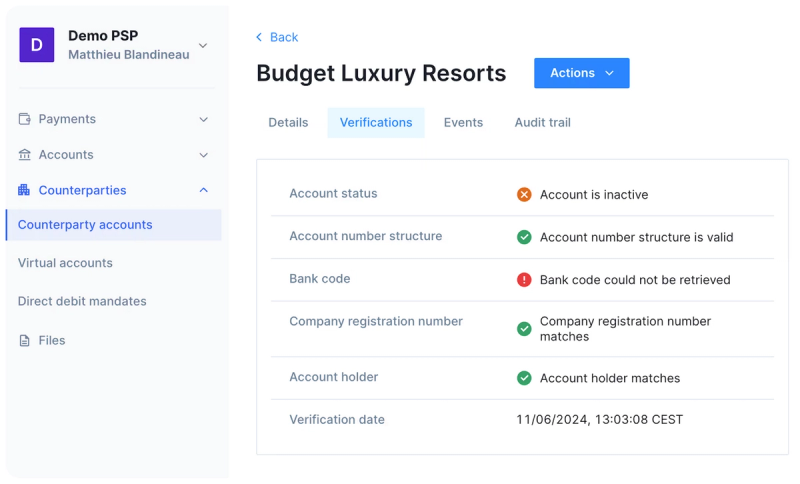
Supported company registration numbers are SIREN, SIRET, and Intracommunity VAT for France and Intracommunity VAT for the Netherlands.
You can find more information about account verification here:
Company registration number is available to Account verification subscribers. If you are interested in Account verification, please contact us.
Bank code lookup: ensure account numbers and bank codes match
Using incorrect BICs can lead to payment failures.
With Bank code lookup, customers can easily retrieve the BIC associated with an IBAN to improve payment success rate and prevent potential fraud.
Bank code lookup is available:
- Using the API, through which customers can submit an IBAN and obtain the corresponding BIC in response
- In the dashboard when creating a payment order or an external account. Clicking on the “Lookup” button will automatically populate the Bank code field based on the IBAN
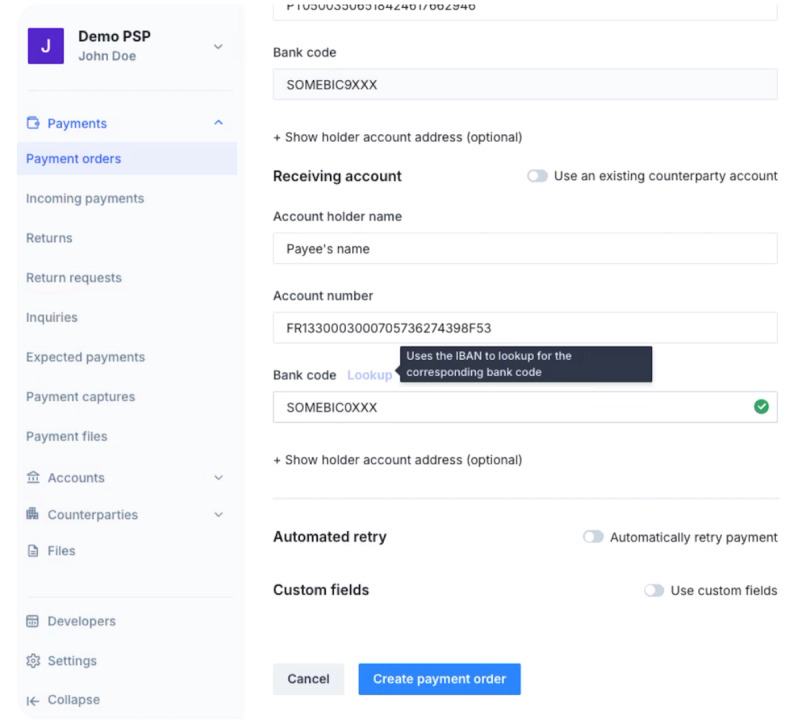
Bank code lookup is available to all customers and currently supports IBANs of the countries listed here.
You can find more information about bank code lookup accounts here:
Improving our dashboard experience for payment and finance teams
Mambu Payments customers can now visualise, for each reconciled payment or transaction, the reconciliation rule used by our automated reconciliation engine to reconcile said payment or transaction.
Mambu Payments customers can access the details of each reconciliation rule configured in their environment.
This feature is available to customers who subscribe to Mambu Payments’ automated reconciliations.
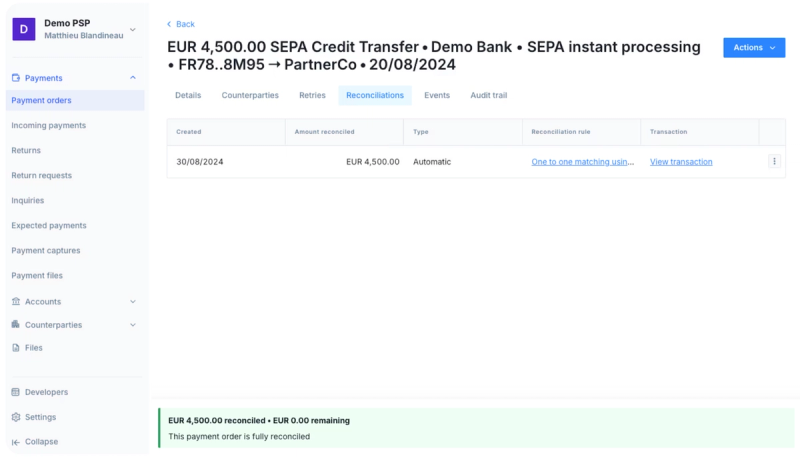
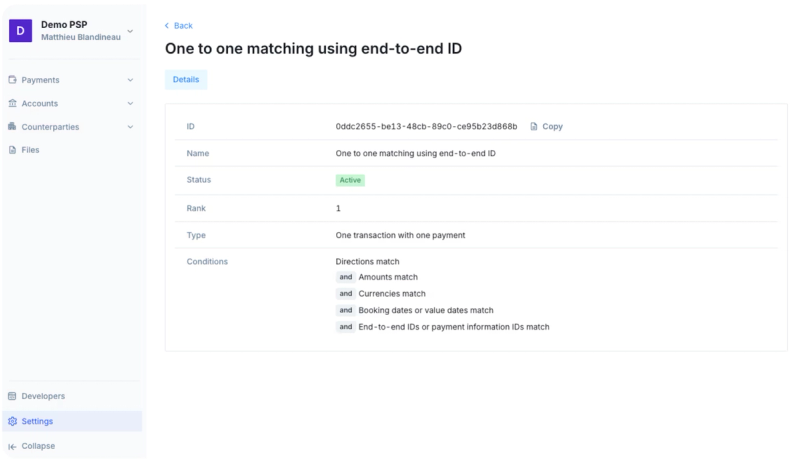
Improved webhooks management for developers
Better webhook events visibility in the dashboard
Mambu Payments customers now can visualise in the dashboard, for each configured webhook, all the events sent to said webhook.
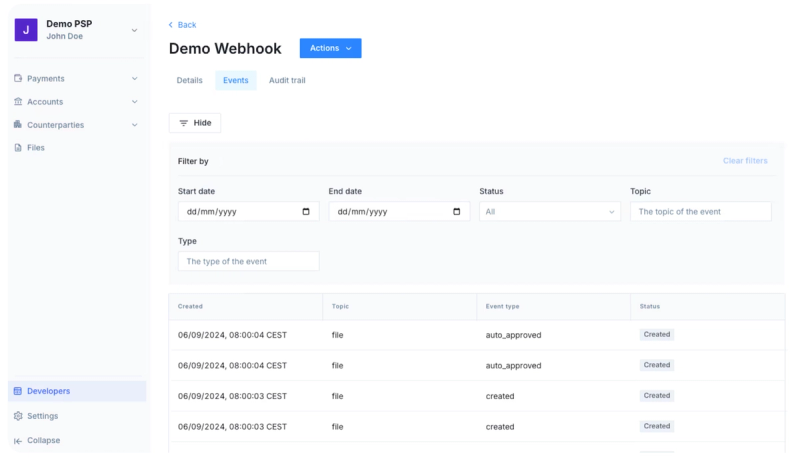
This improvement is available to all customers who have access to the dashboard.
Learn more:
Choose the right event delivery mode for your needs
Customers with large payment volumes might want to increase the webhook event delivery throughput.
To accommodate these use cases, customers can now choose between four event delivery modes on webhooks:

The default delivery mode is individual events. Contact us at if you would like to change your event delivery mode.
Learn more in the documentation.
May 2024
Welcome to May 2024 product update.
This month, our Product team released:
- Payment retries: Reach 100% payment success rate
- Account verification: reduce payment fraud and prevent payment errors.
- Improved manual reconciliation flow
- Treasury, TARGET2 and SCT urgent payments
Learn more about these capabilities below, and do not hesitate to contact us for more information.
Payment retries: reach 100% payment success rate
With payment retries, Numeral customers can automatically retry failed payments, enabling them to reach 100% payment success rate while reducing manual operations and maintaining complete auditability.
How it works
Based on information retrieved from the partner bank, Numeral automatically identifies when a payment fails and why.
When creating a payment order, Numeral customers can assign it an automated retry rule.
Based on information retrieved from the partner bank, Numeral automatically identifies when a payment fails and why. If the failed payment meets the conditions of the rule, Numeral will automatically retry the payment following the assigned rule:
- Immediately or later
- Of a different type, for instance, fallback to a SEPA regular payment if a SEPA instant payment fails
To ensure payments, finance, operation, and support teams can easily keep track of these retries, Numeral records and displays all original failed payments, the resulting performed and planned retried payments, and the retry rules applied.
Learn more in the documentation guide, API endpoint, and changelog.
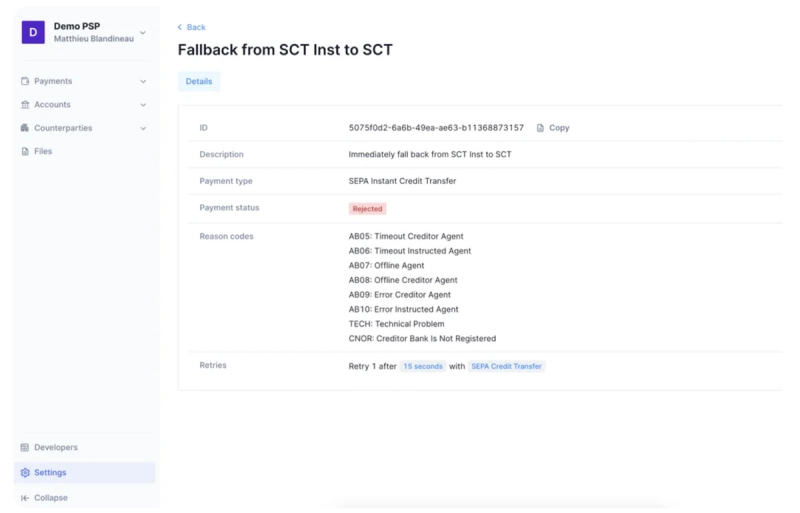
Account verification: reduce payment fraud and prevent payment errors
Inaccurate counterparty data and inefficient processes lead to payment failures and increased fraud risk. 73% of large corporations are hit by payment fraud every year.
With account verification, Μambu Payments customers can verify the validity of account information, including IBAN structure, account holder name, and account status, against trusted sources, enabling them to reduce payment fraud, increase direct debit collection rates, and prevent returns from payment errors.
How it works
Μambu Payments' customers can verify an external account recorded in Μambu Payments from the dashboard or the API.
Available checks are:
- Account status: whether the account corresponding to the provided account number is currently open or not
- Account number structure: whether provided account number is technically correct or not
- Bank code: whether the provided account number and bank code match
- Account holder: check the correspondence of the provided account number and account holder name
After the verification is executed, customers can retrieve whether the account has been successfully verified and the verification results from the dashboard or the API.
You can find more information about account verification here:
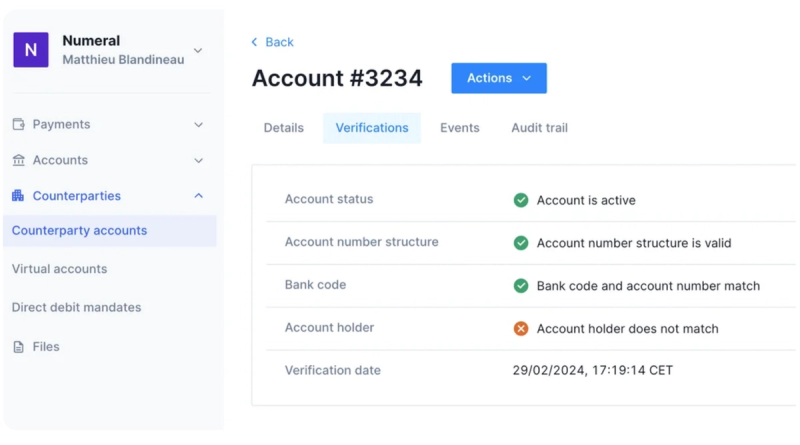
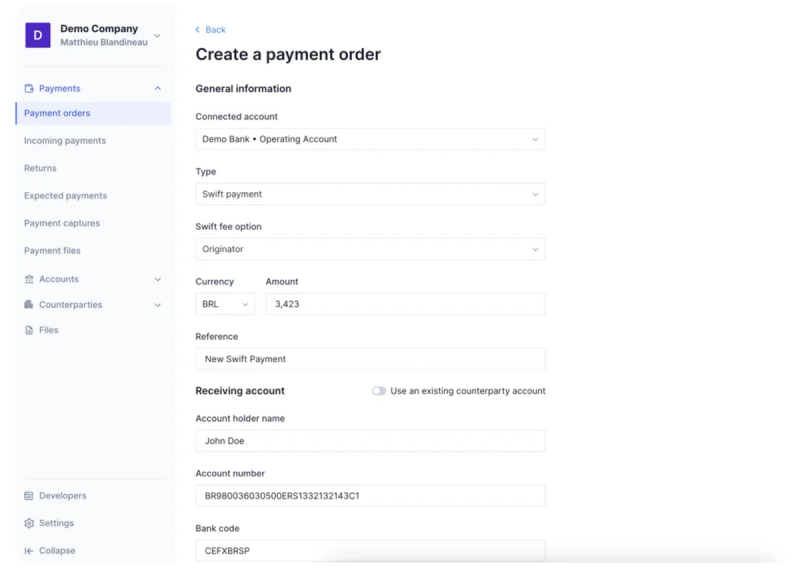
Treasury, TARGET2 and SCT urgent payments
Μambu Payments customers can now automate treasury, TARGET2, and SCT urgent payments using the API or dashboard.
- Treasury payments enable companies or financial institutions to move funds between their own bank accounts, within the same bank or different banks. They are usually same-day payments with no amount limit. They are particularly useful for safeguarding workflows.
- TARGET2 payments enable companies and financial institutions to send high-value and urgent domestic and Euro credit transfers, settled in real time in their partner bank’s central bank accounts.
- SCT urgent payments are SEPA credit transfers that reach the beneficiary account on the same day of execution.
Treasury, TARGET2, and SCT urgent payments are available to all customers with connected accounts at banks supporting these payments via Μambu Payments.
Changelogs:
February 2024
At Mambu Payments, we help fintech companies to automate payment operations at scale.
However, there is no such thing as 100% automated payment operations. Our dashboard enables finance and operations teams to manage and monitor payments, liquidity, and reconciliations across all their accounts and banks from a modern interface.
In this entry, we recap the latest features we added to our dashboard to make the life of finance and operations teams easier.
Better visibility on liquidity with aggregated account balances
Fintech companies work with multiple bank accounts, sometimes spread across multiple partner banks. However, multi-bank payment operations can be complex. One of the complexities is maintaining a clear visibility across all banks, including the available liquidity.
That’s why we launched aggregated account balances in the Mambu Payments dashboard, enabling finance and operations teams to group account balances by currency, bank, country, or any custom dimension through custom fields.
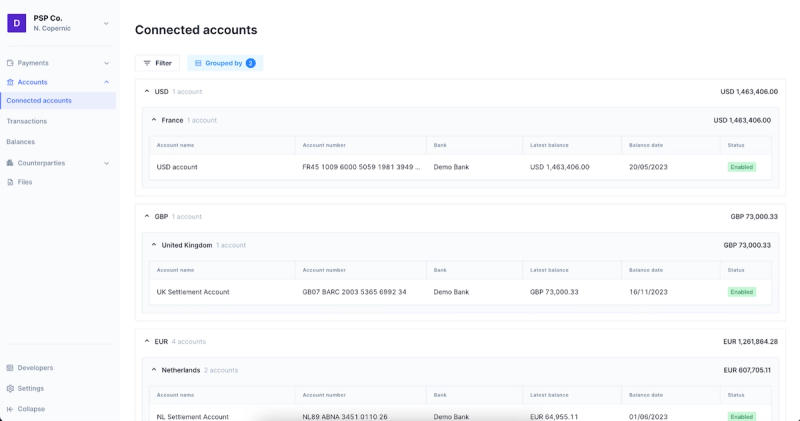
Faster workflows with quick filters and bulk actions
At Mambu Payments, we aim to automate most of the tasks for our customers while enabling them to control what they need to control efficiently.
With quick filters on Mambu Payments objects in the dashboard, finance and operations teams can instantly access the payments, transactions, or counterparties that require immediate attention, such as payments pending validation or unreconciled payments.
With bulk actions, they can approve payments pending approval in one click after quickly reviewing them, saving precious time while maintaining total control.
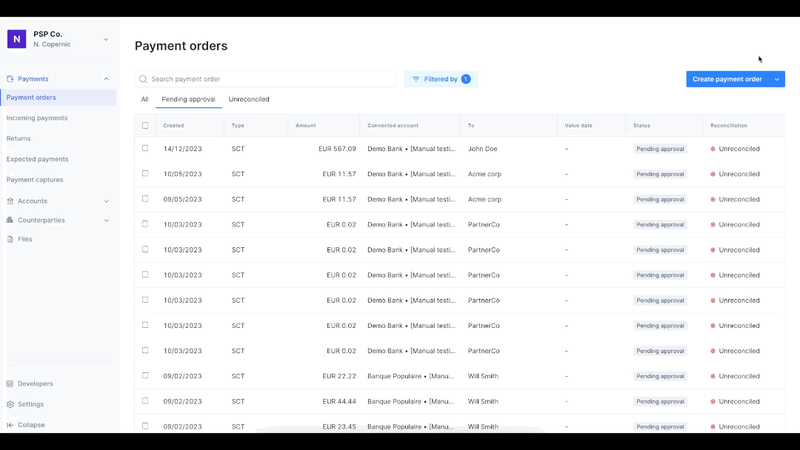
Create multiple payments with confidence thanks to improved payment files upload
Not all batch payments can be automated. All your systems might not be integrated with Mambu Payments yet, some legacy core systems can’t deposit files on our SFTP servers or create payments via API, and there is sometimes the need to create ad-hoc batch payments. The ability to upload payment files in Mambu Payments can be critical.
With the latest additions to the Mambu Payments dashboard, finance and operations teams can upload files to create hundreds of payments with confidence.
On the new Payments files screen, users can see at a glance if the payment files have been successfully uploaded, the number of payments created from a payment file and the number of payments successfully sent, as well as the total amount of payments of an uploaded file.
From this screen, finance and operations teams can also access all the payments created from each file to bulk approve them if necessary or monitor their status.
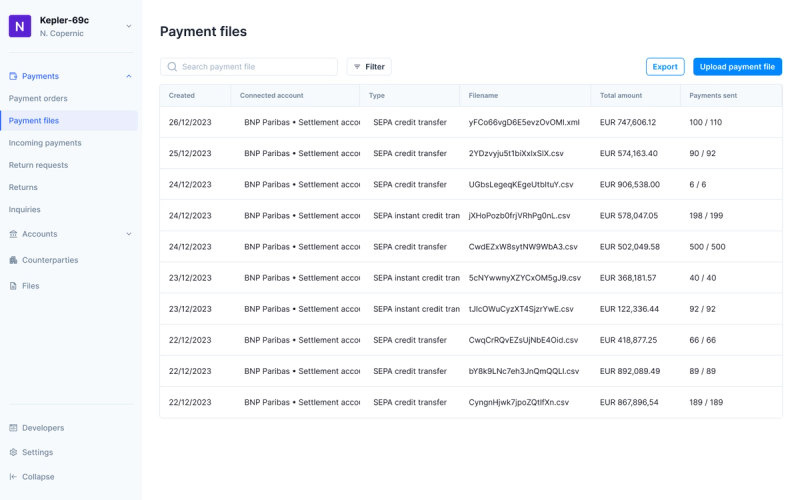
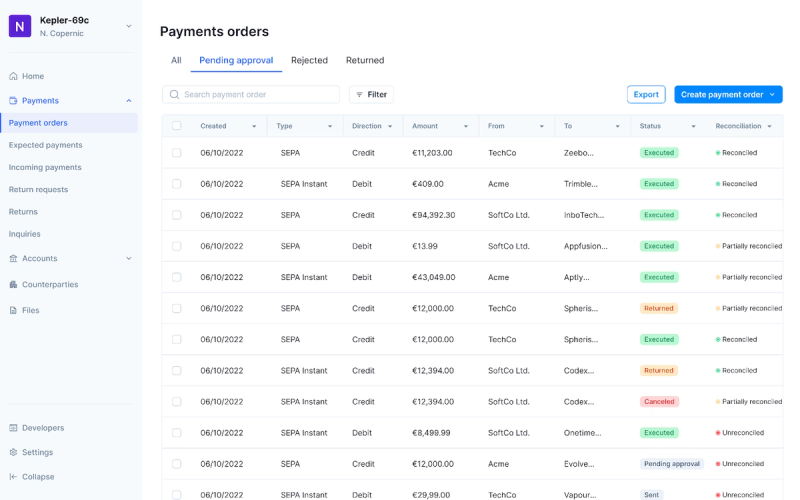
In addition to making batch payments easier, we’ve also added the ability to create interbank payments from the dashboard, so finance and operations teams of customers operating as SEPA, Bacs, or FPS indirect participants can take action autonomously when needed.
More efficient payment data usage with custom fields
Payment and payment-related data are business-critical to most fintechs and companies. It is leveraged in various third-party systems for accounting, business intelligence or fraud and risk management purposes.
As such, fintechs and businesses should be able to easily label each payment, account or transaction according to their specific business logic.
Finance and operations teams also need to categorise and navigate between the different categories of these objects easily for more efficiency.
That’s why custom fields are now available in Mambu Payments. Custom fields are customer-preconfigured fields from which dashboard users can select specific values, enabling these values to be leveraged in third-party systems.
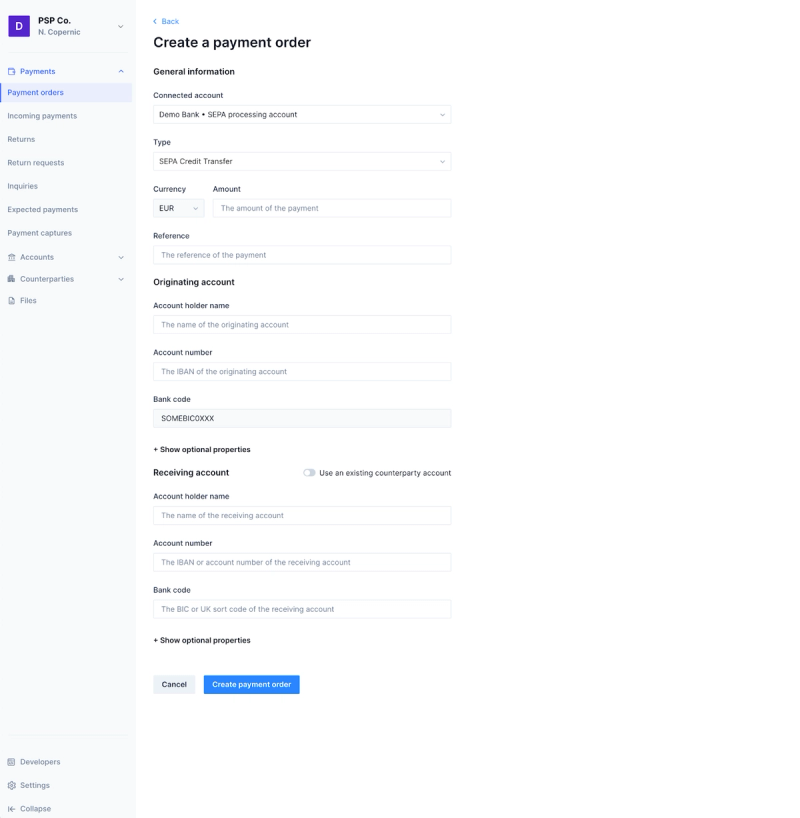
Autumn 2023
Our product and engineering teams have been busy during these summer and back-to-school months. We got ready for the new SEPA rulebooks and expanded our bank coverage, added capabilities that significantly ease the management of direct debits, and delivered new critical features for both finance and operations and product and development teams.
Completed SEPA 2023 rulebook homologation for all SEPA schemes
The European Payment Council is implementing updated specifications for all SEPA payment schemes on 17 March 2024 (formerly 19 November 2023: see update below). These changes represent significant projects for SEPA participants to upgrade their payment systems to comply with the new specifications.
The main change is the structuration of address information in payment messages, information that is mandatory to provide for SEPA payments from or to SEPA countries that are not part of the European Economic Area. In addition to aligning with the latest versions of ISO 20022 standard for payment messages, structured addresses will further reduce errors in payment processing and improve regulatory screening and reconciliation.
Other changes include updates of technical tags used in SEPA messages and the introduction of a “proxy” attribute. It is an identifier that can be attached to a payment message, such as a phone number, a Twitter handle or an email address. Using this proxy name instead could theoretically allow account-to-account SEPA payments without needing an IBAN.
Once developed, these upgrades have to be certified by SEPA sponsor banks, which can represent a multi-week project in itself.
Mambu Payments is proud to be the first company to have completed EPC 2023 rulebook certification with its indirect participant customers and partner sponsor banks for all payment schemes on 14 September 2023.
We intend to keep abstracting the complexity of payment scheme changes for our customers for all supported payment schemes and partner banks, saving them months of development and certification projects.
Last minute update
The EPC has postponed the implementation of its rulebook to 17 March 2024 because major actors of the payment system were not ready for the migration.
This postponement has no impact on our customers. We will roll out the changes required for this migration on 17 March 2024 instead of 19 November 2023.
Facilitating direct debits with any bank
When done right, direct debits are a powerful tool for collecting recurring payments. But doing it right is complex. Direct debits can fail for many reasons, from the debtor account being blocked or closed to the use of incorrect debtor information. Failing direct debits can have significant consequences for companies, including major additional bank fees and uncollected payments.
We aim to enable customers to leverage direct debits’ advantages and reduce their time to liquidity with any bank reliably.
We’re starting with the ability for non-technical teams to view and manage direct debit mandates directly in the Mambu Payments dashboard.
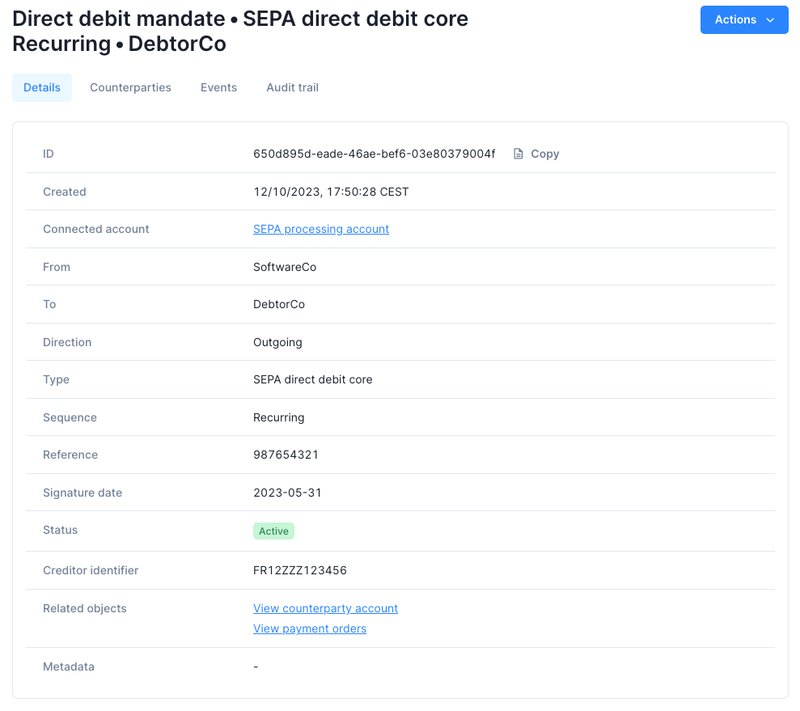
Thanks to easy access to mandate information, including related counterparties, direct debits, and events, finance and operations teams can make sure all incoming and outgoing direct debits linked to a mandate are legitimate and take action if not.
Actions include the ability to block a mandate, preventing any further direct debit related to the said mandate. With SEPA direct debit core, the beneficiary bank doesn’t systematically check if an incoming direct debit respects an existing mandate or not, leading to the risk of illegitimate direct debits. Numeral customers can block counterparties, automatically rejecting any incoming direct debit request from said counterparties.
We also added capabilities facilitating the management of outgoing direct debits. Customers can now schedule a direct debit payment at a further date when creating it in Numeral.
Additional capabilities simplifying the management of the entire lifecycle of direct debits, from mandate creation to automatic direct debit retries, will follow this quarter and beyond.
Easier counterparty account creation for finance and operations teams
Finance and operations teams can now create new counterparty accounts directly from the dashboard, enabling them to run tests, resolve customer support requests or add counterparty accounts for internal use without technical help.
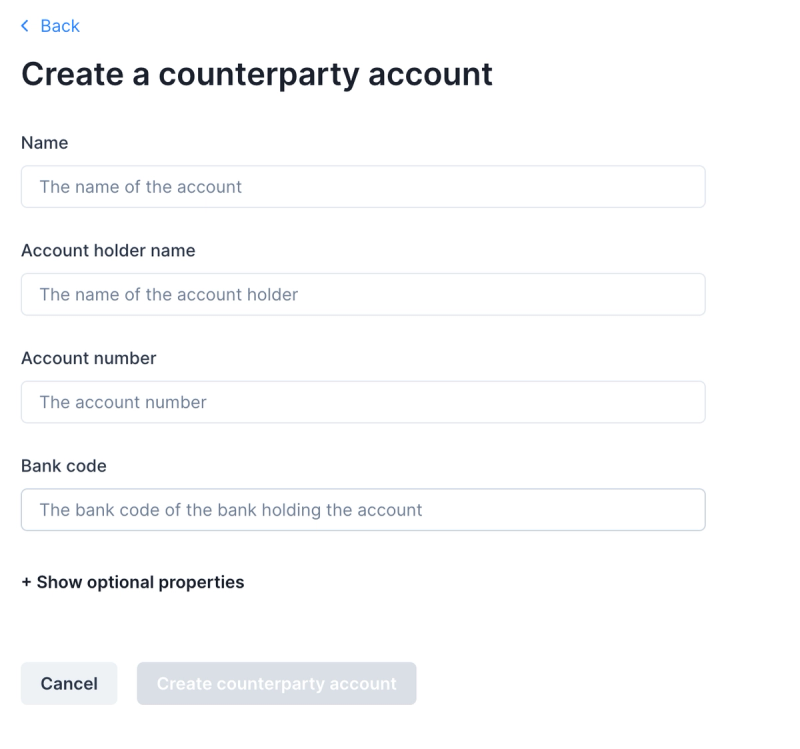
Increased auditability and trust with audit trails
Following the introduction of roles and permissions to decrease the risk of unauthorised actions on bank accounts connected through the platform, we released audit trails in the dashboard.
With audit trails, authorised users can have a full understanding of the sequence of events and which users performed them when investigating errors or suspicious or unauthorised actions and take actions in consequence.
Audit trails are available for all objects of the Mambu Payments platform.

New implementation and automation tools for developers
Retry failed events from the dashboard
We introduced the ability to retry sending failed events directly from the dashboard. It enables product and engineering teams to easily update relevant systems or test their webhook implementation, even in the case of an event that fails.
New retry payment order endpoint
Payments can fail for various reasons: banks’ cash management system being unavailable, payment blocked by the beneficiary bank, or beneficiary bank not supporting instant payments. In many cases, simply retrying the same payment immediately or at a later time or changing its type can result in a successful payment.
However, developing the logic to keep track of failed payments and creating new payment orders to retry these payments can be complex. That’s why we did it for our customers.
With the new Retry a payment order API endpoint, developers can automatically retry a failed payment as is or:
- By sending it from another connected account
- With another type, for instance, a SEPA direct credit instead of a SEPA instant direct credit
- At a later date
We have a busy roadmap for the months to come. Subscribe to our newsletter to get our latest updates, and contact us if you have specific payment needs you are looking to solve.
Spring 2023
This spring, we expanded our bank coverage to better support our customers throughout continental Europe and the UK and added new key features to our dashboard to give finance, treasury, and payment operations teams more autonomy.
Adding Mambu Payments' second pan-European integration with HSBC
Following ABN AMRO earlier this year, we’re pleased to announce our second integration enabling customers to access EU and UK payment schemes from a single partner bank.
HSBC customers can now connect their EUR and GBP accounts to Mambu Payments. With this new bank integration, customers can send, receive, and manage SEPA credit transfers, Faster Payments, and Bacs direct credit payments from a unique API and dashboard.
Simplifying workflows for finance, treasury, and payment operations teams
While we aim at automating as many payments and treasury tasks for our customers, payment issues and exceptions requiring manual reviews and actions will always happen. In addition, non-technical teams need to maintain total control and visibility of their payment operations. As a result, we added several new features and capabilities to our dashboard this spring.
Payment orders creation flow
Customers can now create payment orders from the dashboard with the same level of control and security as they would experience from the API.
It enables treasury and payment teams to resolve payment issues, manually manage their treasury, or send exceptional payments without the intervention of engineering teams.
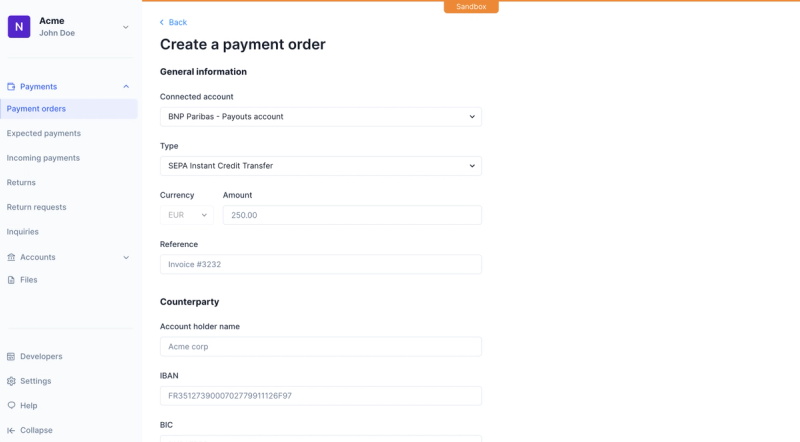
Connected account balances
Finance, treasury, and payment operations teams can now see the balances of their connected accounts in the dashboard.
Enabled with a centralised view of account balances in a single interface, finance, treasury, and payment operations teams can ensure they have sufficient funds on their settlement accounts at all times, assess the distribution of funds across their different partner banks, and ensure customer funds are properly safeguarded.
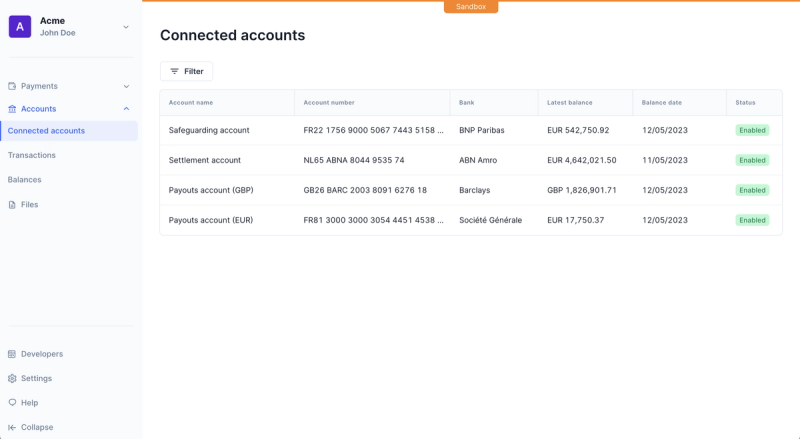
Return requests and inquiries approval flows
Payment operations teams of SEPA indirect participants can now approve and deny return requests and inquiries directly from the dashboard.
It enables them to resolve these specific payment flows in no time, without the intervention of engineering teams, creating a better experience for their end users.
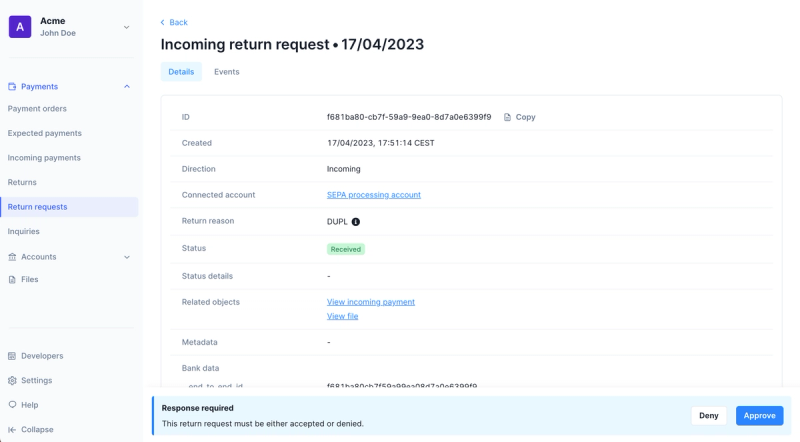
March 2023
Adding support for Faster Payments in the UK
In addition to SEPA instant credit transfer, Mambu Payments customers can now send payment orders using the Faster Payments (FPS) payment scheme in the United Kingdom. In this regard, sort codes and UK domestic account numbers are now supported by the bank_code and account_number parameters when creating payment orders.
Adding support for ABN AMRO
Customers can now connect their ABN AMRO account to the Mambu Payments platform and start automating their SEPA credit transfer and FPS payments.
Returns related to rejected SEPA credit transfers
Last June, we started supporting R-transactions for SEPA indirect participants. However corporate customers can also benefit from increased visibility on specific payment errors and exceptions.
In February, we launched a feature to capture SEPA direct debit R-transactions. We just released a similar feature to capture SEPA credit transfers that fail later in the chain as return objects for banks’ corporate customers. They are automatically linked to the original payment orders and can be reconciled with a related credit bank transaction.
New Inquiries screen in the dashboard
We’re excited to launch the Inquiries screen in the dashboard, which lets finance teams review the incoming SEPA inquiries related to return requests.
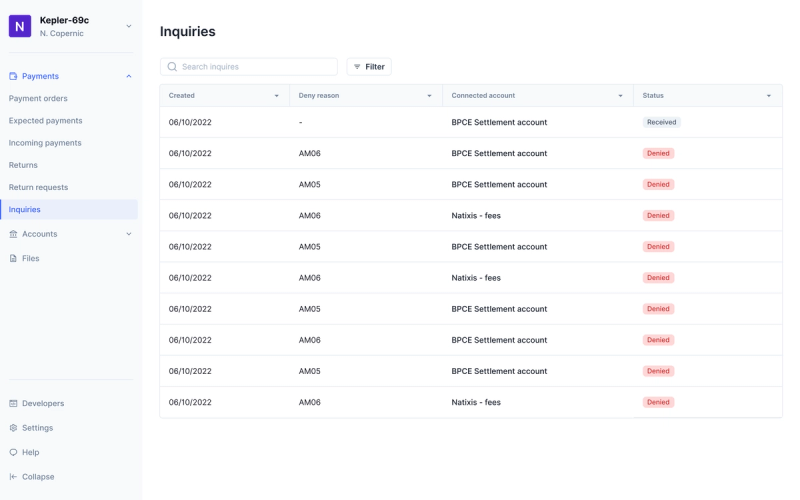
February 2023
Advanced monitoring capabilities of SDD R-transactions
SEPA direct debit (SDD) payments are strongly linked to complex R-transaction flows that include returns, refunds and rejects. Mambu Payments abstracts this complexity by offering advanced monitoring of SDD R-transactions.
On the one hand, Mambu Payments immediately updates the SDD payment order status when an R-transaction occurs.
On the other hand, Mambu Payments creates a proper SDD return object linked to the original payment order, enriched with a documented return reason. Such SDD returns are expected to automatically reconcile with the corresponding debit entries in the customer’s bank statement.
Enabling file automatic approval
In December 2022, we enabled customers to skip the payment approval flow when creating a payment order.
This month, we have launched the file automatic approval feature, enabling customers to activate or deactivate the file approval flow as a setting of their connected account. From now on, all the approval flows, at the payment and file levels, are fully customisable and can fit with any customer approval use case.
New Returns screen in the dashboard
We’ve been working on a brand new page to show Return objects in the dashboard. Corporate customers can have a quick look at their SEPA direct debit refusals or rejections, and perform related investigations. Similarly, financial institutions will have an overview of all the returns exchanged with their sponsor bank.
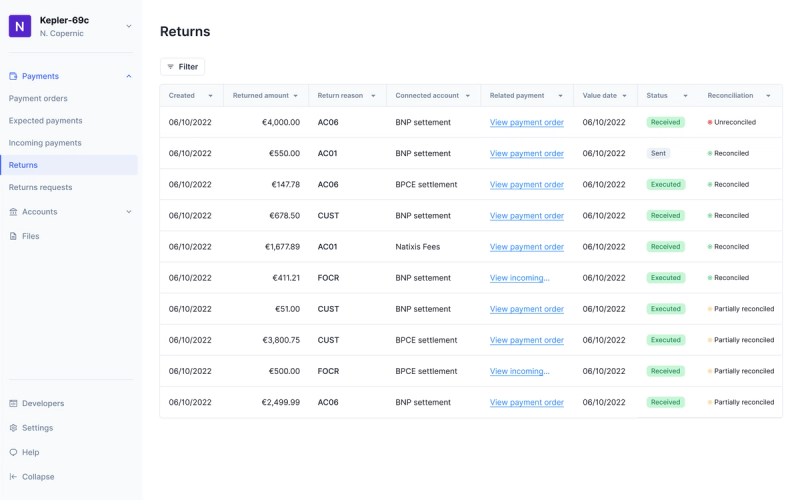
January 2023
Following the launch of Mambu Payments’ dashboard last month, January has been all about introducing new features to support payment teams better.
New dashboard features for SEPA indirect participants
We’re pleased to announce that regulated financial institutions can now access the following new features in the dashboard: incoming payments to get an overview of the SEPA payments they receive on behalf of their customers and return requests page to view incoming and outgoing return requests.
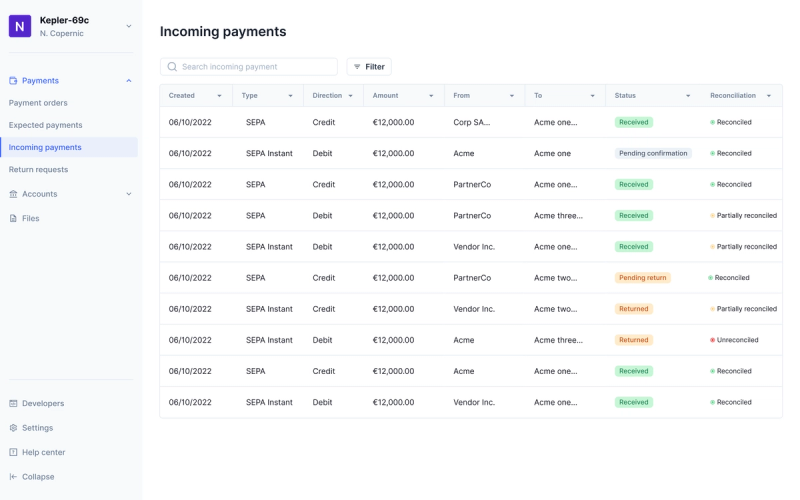
Payments and files approval flows
In addition to the API-based approval flows that developers can already use to approve or cancel payment orders and files, the dashboard now offers the capability to do so. As a result, you can initiate payment orders from the API and let a member of your finance team review them from the dashboard before your bank processes them.
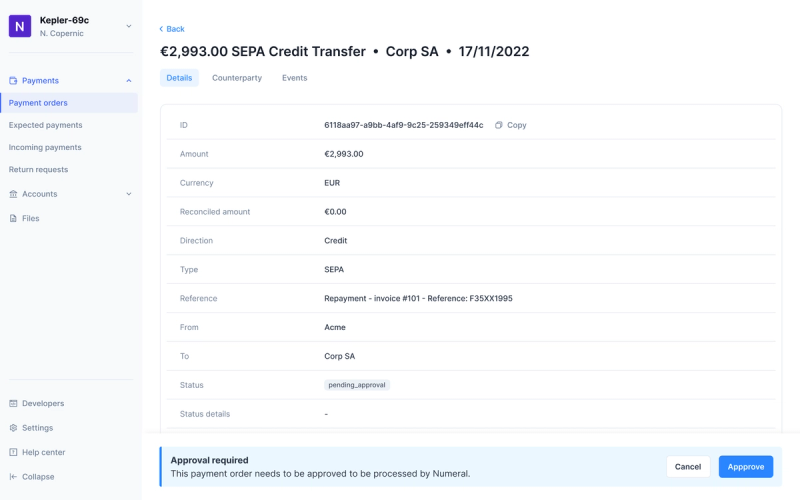
December 2022
Launching Mambu Payments dashboard
We’re excited to announce the launch of the dashboard, a new product dedicated to finance and operations teams. The dashboard streamlines access to payments and transactions, so finance teams can investigate failed payments and support customers more easily.
It also enables product and engineering teams to issue and manage API keys for a faster implementation. As a result, the dashboard is the payment back-office that you won’t need to build internally.
Expanding virtual accounts capabilities
In November, we enabled users to create virtual accounts and link them to counterparties. From now on, customers can manage the lifecycle of their virtual accounts by assigning them to counterparties, unassigning them from counterparties, updating their name and metadata and disabling them.
Besides, when disabling a counterparty, the related virtual accounts remain active but get unassigned immediately with a proper event sent to the customer’s webhook.
November 2022
In November, we doubled down on payment automation with payment order automatic approval and introduced virtual accounts management into our platform.
Enabling payment order automatic approval
We are now enabling customers to skip the payment approval step when creating a payment order. It makes it possible to create payments faster for customers which already have approval rules in their app. To trigger a payment order automatic approval, the customer must add the parameter
auto_approval
set to
true
in the Create a payment order payload. Payment will be created in status
approved
before being sent to the bank, while an event
auto_approved
will be created and sent to the customer’s webhook.
Launching virtual accounts features
Since May, customers have been able to retrieve a bank transaction’s virtual account number and specify a virtual account number when creating an expected payment. Since July, the Mambu Payments automatic reconciliation engine has been able to leverage the virtual account number of both expected payments and transactions to trigger a reconciliation. From now on, customers can create virtual accounts, link them to a bank account and assign them to a counterparty. The virtual account capabilities will soon be completed by new features enabling any customer to manage the lifecycle of their virtual accounts.
October 2022
In October, we expanded our payment methods coverage for SEPA indirect participants, with the support of SEPA instant credit transfer.
Adding full SEPA instant credit transfer support for SEPA indirect participants
We now support instant credit transfer for SEPA indirect participants, starting with BPCE Payments. In addition to enabling SEPA indirect participants to send and receive SEPA instant credit transfers, we now enable indirect participants to process R transactions and inquiries for SEPA instant credit transfers. The following features are now live for SEPA indirect participants:
- Payment orders: sending SEPA instant credit transfers
- Incoming payments: receiving and confirming or rejecting incoming SEPA instant credit transfers
- R transactions and inquiries: same support as for regular SEPA credit transfers
September 2022
In September, we doubled down on reconciliations by introducing a customisable reconciliation engine, and started supporting the EBICS protocol.
Launching our customisable reconciliation engine
In July, we launched automated reconciliations for SEPA indirect participants, enabling them to automatically reconcile SEPA payments, R transactions, and settlements.
This month, we took our reconciliation engine further by enabling companies to customise it to fit their most sophisticated and unique bank reconciliation use cases.
Supporting EBICS
We are now supporting EBICS as bank connectivity, in addition to SFTP and APIs, enabling customers to connect to more banks in France and Germany.
August 2022
August has been a busy month, with the addition of SEPA direct debit as a new payment method as well as the support of counterparties.
Launching SEPA direct debit
With the launch of SEPA direct debit, in addition to SEPA credit transfer and SEPA instant credit transfer launched in February and July respectively, Mambu Payments now supports all SEPA payment methods. SEPA direct debits are payments pulled from a debtor’s bank account by a creditor using a direct debit mandate. They can be used to collect software subscriptions, insurance premiums, loan repayments, or any form of one-off or recurring payments. We are currently supporting BNP Paribas and Société Générale and will progressively expand support to other banks. Learn more in our SEPA direct debit guide.
Now supporting counterparties
Counterparties are companies or individuals companies send payments to or collect payment from. Until now, Mambu Payments customers had to pass to the API all counterparty information, such as name and account number, to create a payment order or expected payment. With the support of counterparties, customers can now create counterparties and counterparty accounts in Mambu Payments and use their Mambu Payments IDs to create and filter payments. Multiple counterparty accounts can be linked to a single counterparty and payments can be filtered by counterparty or counterparty account to give customers a view of their payments per counterparty. Find out how to use counterparties in our guide.
July 2022
This month, we are excited to announce the launch of SEPA instant credit transfer as a new payment method as well as our new automated reconciliation engine.
Launching SEPA instant credit transfer
We are now supporting SEPA instant credit transfers, starting with Société Générale. SEPA instant credit transfers can be sent 24 / 7 / 365 and are credited to the beneficiary account within 10 seconds from being sent by the sending bank. Payments are updated in real time as they are processed by the sending bank and credited on the beneficiary account. We will progressively expand support of SEPA instant credit transfer to other banks connected to the platform.
Introducing automated reconciliations
We are now supporting automated reconciliations, starting with SEPA indirect participant payment flows. Mambu Payments automatically reconciles SEPA payments and returns sent and received with the corresponding settlements. Depending on how transactions are booked, reconciliations can either be one-to-one (if payments are settled in individual transactions) or many-to-one (if multiple payments are settled in one transaction). We will progressively expand automated reconciliations to corporate payment flows.
June 2022
This month, we are happy to announce that we are now fully supporting SEPA indirect participant payment and related flows, starting with BPCE Payments as our first SEPA sponsor bank connected to the platform.
Supporting SEPA indirect participant payment and related flows
SEPA indirect participants are financial institutions, such as payment institutions, electronic payment institutions, or credit institutions, that connect to the SEPA schemes through a SEPA sponsor bank.
Becoming a SEPA indirect participant is a major step for growing financial institutions. It enables a much deeper control over payment flows and a much improved end-user experience. SEPA indirect participants can issue their own IBANs, send and receive payments in the names of their customers, and process related flows, such as returns and return requests. Becoming a SEPA indirect participant also comes with more complex bank integrations, additional payment and related messages to support, and longer implementation projects.
Mambu Payments abstracts the complexity of becoming a SEPA indirect participant and connecting to a SEPA sponsor bank. With Mambu Payments, all SEPA indirect participant payment and related flows can be managed using a single API:
- Sending payments through payment orders
- Receiving payments through incoming payments
- Processing payment status reports through events and webhooks
- Managing returns
- Managing return requests
- Managing inquiries
- Receiving account statements through balances and files
- Reconciling settlements
Adding BPCE Payments as our first SEPA sponsor bank
BPCE Payments is the first sponsor bank to be integrated with Mambu Payments, with Société Générale and BNP soon to follow.
May 2022
This month, we are excited to announce the launch of reconciliations as a new building block to our platform as well as expected payments as a new type of payments.
Launching reconciliations
Companies with large volumes of payments need to reconcile them with account transactions to make sure that all payments have been accounted for and that every transaction corresponds to a legitimate payment. This enables them to close books faster and with a higher degree of confidence.
We are now enabling customers to reconcile payments and transactions using the API. Customers can create one-to-one, many-to-one, and many-to-many reconciliations between payments and reconciliations to support use cases and the most sophisticated reconciliation needs.
Introducing expected payments
With expected payments, customers can now reconcile transactions with payments that are not initiated through Mambu Payments. These can be bank transfers received, direct debits, or any type of payment currently not supported by Mambu Payments. Customers can now use Mambu Payments as the single source of truth for all their reconciliations.
Expected payments can be enriched with metadata and can also be combined with virtual accounts to further facilitate the reconciliation between expected payments and transactions.
April 2022
This month, we have added Société Générale as a new bank.
After BNP Paribas, we have added Société Générale as our second bank connected to the platform, initially supporting SEPA credit transfers as well as balances and transactions.
If you are banking with Société Générale and / or BNP Paribas, you can now connect all your accounts through a single API.
March 2022
This month, we have added support for account transactions and balances as well as virtual account numbers.
Retrieving account statements and creating balances and transactions
Mambu Payments is now retrieving account statements from connected bank accounts and creating the related balances and transactions. Balances and transactions are normalised across banks. They are returned in a standard format that includes booking date, value date, amount, direction, currency, category, remittance information, and counterparty information, when available.
Exposing virtual account numbers
An increasing number of banks enable customers to use virtual account numbers to facilitate the allocation of payments received based on their virtual accounts. Mambu Payments retrieves virtual account numbers from account statements and exposes them in the transaction.virtual_account_number attribute.
February 2022
We are happy to announce the launch of our platform and first bank integration with BNP Paribas, initially supporting SEPA credit transfers.
How the integration works
Mambu Payments abstracts the complexity of bank connectivity and messages with a single API. Behind the scenes, Mambu Payments batches payment orders created by customers into payment files and sends them to the bank. Mambu Payments also retrieves payment status report files from the bank and updates the status of the corresponding payment orders in real time. As payment orders are processed and updated, Mambu Payments creates events that can be received through webhooks or retrieved using the API.
